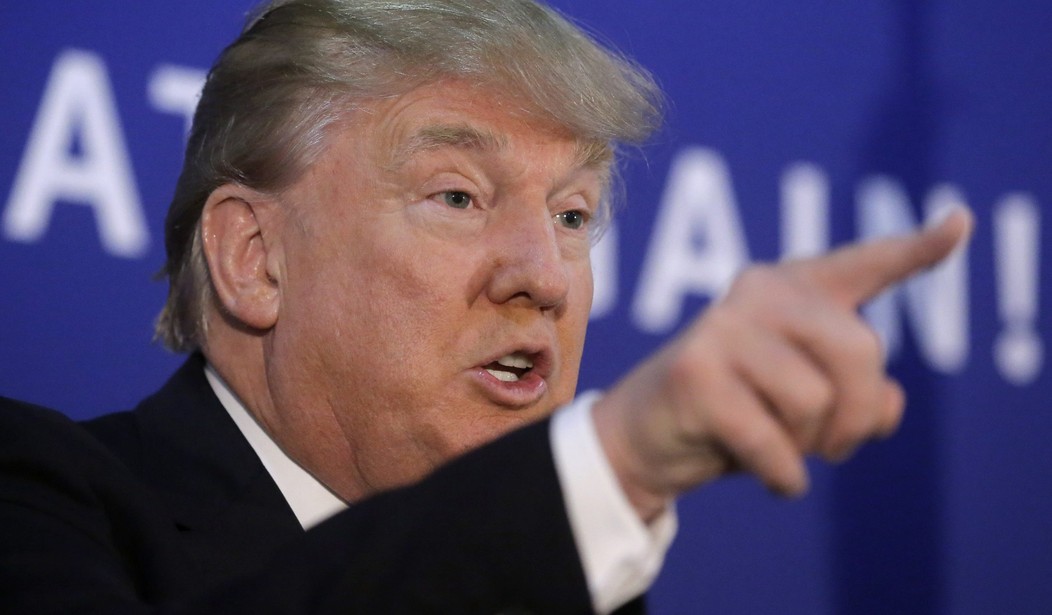The editors of National Review, America’s flagship conservative publication, are leading a conservative charge against Donald Trump, and they have come out not with personal animosity, but with a studied view of Trump’s total lack of commitment to conservative principles. To me, as a millennial conservative, what the publication of William F. Buckley, Jr. and Russell Kirk says matters to me. This is what they conclude: “Donald Trump is a menace to American conservatism who would take the work of generations and trample it underfoot in behalf of a populism as heedless and crude as the Donald himself.”
Here are the five ways the editors note he will not advance the conservative cause:
1. Immigration: Trump is for backdoor amnesty.
Trump’s “big door” in his massive wall is “an implicit endorsement of the dismayingly conventional view that current levels of legal immigration are fine.” Moreover, Trump would support mushy back-door amnesty: he would “re-import many of the illegal immigrants once they had been deported, which makes his policy a poorly disguised amnesty (and a version of a similarly idiotic idea that appeared in one of Washington’s periodic ‘comprehensive immigration’ reforms). This plan wouldn’t survive its first contact with reality.”
This matters to me because National Review is not soft on immigration. In fact, they came out swinging against Marco Rubio and Chuck Schumer’s Gang of Eight bill in 2013 with the headline, “Kill the Bill” and the claim that “Passing Any Version of the Gang of Eight’s Bill Would be Worse than Passing Nothing.”
2. Foreign Policy: Trump is a flip-flopping victim of flattery.
The only consistency in Trump’s foreign policy is his nationalism. He consistently talks in terms of “America first,” but the editors note that it seems unlikely he has any idea what our interests are:
Sometimes he wants to let Russia fight ISIS, and at others he wants to “bomb the sh**” out of it .… For someone who wants to project strength, he has an astonishing weakness for flattery, falling for Vladimir Putin after a few coquettish bats of the eyelashes from the Russian thug. All in all, Trump knows approximately as much about national security as he does about the nuclear triad — which is to say, almost nothing.
3. Poll-obsession: Trump has his finger in the wind, swaying with the polls.
The editors argue Trump is the “most poll-obsessed in all of American history.” And they are not wrong. Trump talks about his poll numbers in every interview, every speech, and virtually every moment he can. He even turns to his poll numbers when talking about God. This makes Trump likely to be more a finger-in-the-wind president than even Bill Clinton. As soon as conservative policies don’t poll well, he will probably abandon them.
4. Limited Government: Trump has no commitment to shrinking the state.
To National Review’s editors, Trump is no different than many establishment figures: they don’t really have a disagreement with liberals over the current size and scope of government, only that they should be at the helm of the government.
He has shown no interest in limiting government, in reforming entitlements, or in the Constitution. He floats the idea of massive new taxes on imported goods and threatens to retaliate against companies that do too much manufacturing overseas for his taste. His obsession is with “winning,” regardless of the means — a spirit that is anathema to the ordered liberty that conservatives hold dear and that depends for its preservation on limits on government power … He appears to believe that the administrative state merely needs a new master, rather than a new dispensation that cuts it down to size and curtails its power.
The main flashpoint in the Tea Party versus Establishment battle has been over Republicans obsessed with “governing” instead of cutting the government down to size, where governing means doing the Democrats’ bidding but maybe more gradually and more efficiently. And the governing model, ultimately, is what a Trump presidency would lead to.
5. Experience: He has none in government and wasn’t even that great a businessman.
Trump’s lack of experience does not recommend him for the job, rendering him “like a man with no credit history applying for a mortgage — or, in this case, applying to manage a $3.8 trillion budget and the most fearsome military on earth.” But his main record as a businessman also does little to reassure a conservative that he would lead with principle:
Trump’s primary work long ago became less about building anything than about branding himself and tending to his celebrity through a variety of entertainment ventures, from WWE to his reality-TV show, The Apprentice. His business record reflects the often dubious norms of the milieu: using eminent domain to condemn the property of others; buying the good graces of politicians—including many Democrats—with donations.
At the end of the day, Republican voters will make up their own minds about Trump. But the consistent voice of conservative principle has spoken, and spoken ill of Trump.









Join the conversation as a VIP Member